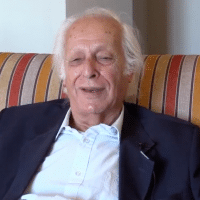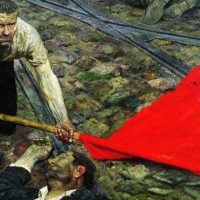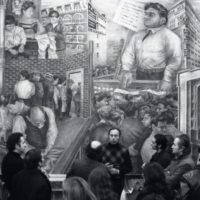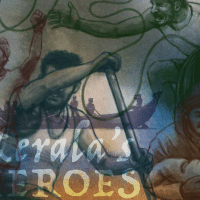-
Imagining the Green New Deal with Robert Hockett
In this episode, we speak with Robert Hockett, Edward Cornell Professor of Law at Cornell Law School. At Cornell, about his role in crafting the Green New Deal Resolution, his conception of finance as a franchise, and his experience as an advisor to Congresswoman Alexandria Ocasio-Cortez as well to Senators Sanders and Warren.
-
Samir Amin: The organic intellectual
The film ‘Samir Amin: The organic intellectual’ depicts the audacious struggles of, as well as interviews with, addresses by and special moments involving this most outstanding intellectual of the South.
-
Killing the most beautiful things we own
The fight over the Amazon is not new, but the scale of its potential destruction has considerably increased. The protagonists of the murder of the Amazon are clear: capitalist firms of different scales and the political class that enables them.
-
Chagos and the dark soul of the British Labour Party
This analysis shows there could be no more startling illustration of the operation of the brutal and ruthless British Establishment in an undisguisedly Imperialist cause.
-
A new civilising mission
The campaign to ‘liberate’ Algerian women sheds light on the contemporary place of Muslim women in France—and the double aggression against them, both by the state and by a section of the feminist movement.
-
Lawyer brings pieces of history back to Vietnam
American lawyer Nancy Hollander recently handed 450 documents, photographs and other memorabilia concerning the first meeting between the Vietnamese Women’s Union and the U.S. Women Strike for Peace Organisation in Jakarta in 1965, to the Vietnamese Women’s Museum.
-
Utsa Patnaik on agrarian history and imperialism
Humanity does not end where Europe ends, or America ends. Lenin’s contribution as well as Rosa Luxembourg’s work are both of inestimable value because they applied the Marxist method to areas that Marx himself had not touched.
-
Students, the Sixties, and How to ‘Fail Better’
With their wide range of styles and perspectives, these little memoirs give a good sense of the period and the issues, but their value is more than historic. As a new generation is being drawn to radical politics, today’s activists may be able to gain useful insights from the experiences of their predecessors.
-
Historic ruling by the World Court: the U.S. base on Diego Garcia was obtained in violation of international law
The U.S. airbase on the Indian Ocean island of Diego Garcia is among the most crucial and heavily used. With this ruling by the International Court of Justice the brand of a cruel and blatant violation of international law has been fixed for all time—and U.S. military control of the island may finally be over.
-
Myth of the Medieval Jewish Moneylender with Julie Mell
On this episode, Scott Ferguson and Maxximilian Seijo speak with Mell about these and other connections that may be drawn between her own and neochartalism’s critical projects.
-
Twelve step method to conduct regime change
What happened to Chile in 1973 is precisely what the United States has attempted to do in many other countries of the Global South. The most recent target for the US government—and Western big business—is Venezuela.
-
Direct Job Creation in America with Steven Attewell
In this episode, we’re joined by Steven Attewell, Adjunct Professor of Public Policy at the City University of New York’s School of Labor and Urban Studies.
-
Karl and Rosa: 100th anniversary
The masses of red flowers for Karl Liebknecht and, even more for Rosa Luxemburg, was higher than I have ever seen them. Both were murdered one hundred years ago. Why do those two names mean so much to so many people?
-
Money & Power with Jamee Moudud
In this episode, we’re joined by Jamee Moudud, a professor of economics at Sarah Lawrence College, Jamee draws on the tradition of critical legal studies to extend the constitutional theory of money to new historical and international contexts.
-
“Hell No!’—Stokely Carmichael twenty years on
Within a timeframe of hardly four years, Stokely Carmichael’s organizational efforts evolved from the mobilization of black voters in Alabama and Mississippi to building a large movement resisting the military draft at the height of the Vietnam war, culminating in the SNCC’s “Hell No! We Won’t Go!” campaign.
-
Dossier 9: How Kerala fought the heaviest deluge in nearly a century
In the summer of 2018, the Indian State of Kerala was hit by severe rains and flood–the heaviest in nearly a century. The deluge affected 5.4 million people in this southern Indian state with a population of 35 million.
-
A guide to principled anti-Zionism
An optimal anti-Zionism supersedes Palestine’s geography. It likewise transcends ethnocentric interests. Anti-Zionism is a politics and a discourse, sometimes a vocation, but at its best it is also a sensibility, one attuned to disorder and upheaval. It is a commitment to unimaginable possibilities—that is, to realizing what arbiters of common sense like to call “impossible.”
-
A decade since the 2008 crash
Ten years since financial markets crashed in the United States, the world economy is anything but near so-called “recovery.” Ever more urgent is the need for people’s sovereignty, which could be a key principle in orienting economic and development policy especially in the global South today.
-
The history of the workers’ unemployment insurance bill
At a time when the American population is radicalizing, when popular movements are coalescing around “radical” demands—Medicare for All, the abolition of ICE, tuition-free college, etc.—it can be useful to draw collective inspiration from the Workers’ Bill proposed by the U.S. communist party in 1930.
-
Review of River of Dark Dreams
This marvelous work of history is a must read for anyone trying to understand the dynamics of slavery in the United States in the pre-Civil War period. Walter Johnson locates slavery as playing a central part in the development of a particularly racialised and oppressive capitalism in the slave states.




















